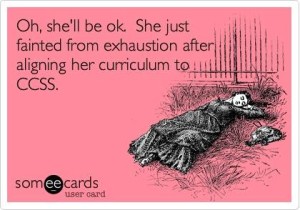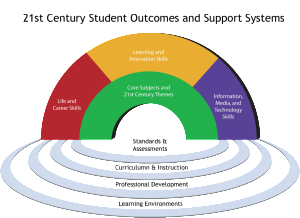 A Buffy Hamilton post (http://dmlcentral.net/blog/buffy-hamilton/libraries-‘sponsors-literacy-and-learning-peeling-back-layers) which I shared on The School Librarian’s Facebook page, reminded me about the important differences between questions and answers. In the current situation with the Common Core Curriculum, our schools are focused more than ever on ensuring that students know the answers. It is what testing is all about. And tests produce the data which in turn drives education.
A Buffy Hamilton post (http://dmlcentral.net/blog/buffy-hamilton/libraries-‘sponsors-literacy-and-learning-peeling-back-layers) which I shared on The School Librarian’s Facebook page, reminded me about the important differences between questions and answers. In the current situation with the Common Core Curriculum, our schools are focused more than ever on ensuring that students know the answers. It is what testing is all about. And tests produce the data which in turn drives education.
The idea behind Common Core is that by developing a more rigorous curriculum, students will improve the College and Career Readiness Skills (capitals are those of the Common Core). The theory is with students better prepared for college and the work world, they will be better capable of competing in the 21st century. But answers merely show students have demonstrated they have mastered the material as presented. They understand what has already been done—been achieved. It doesn’t move them forward. Answers are an end.
Innovation is powered by questions. Buffy asks an incredible number of questions to assess where the library program has gone and where it needs to move to be even better. We all need to focus more on great questions, which is what true critical thinking is. So here are some questions to start you off:
Based on what you already know, what does do you think is needed next?
What do you need to know more about?
What might be done differently?
Where can you get support and help?
Inquiry based learning which is at the heart of the AASL Standards for the 21st-Century Learner, requires students to develop questions to direct their research into areas of interest to them around a given topic. Increasingly, teachers are expected to formulate Essential Questions for units and lessons. (I do a workshop on Essential Questions and Enduring Understandings.) Many colleges want students to have an Essential Question rather than a thesis argument for their research projects.
And yet—in the classroom, it’s answers that count.
 Wouldn’t it be wonderful if someplace on the high stakes tests, students were expected to develop one or two questions based on a reading they did or a problem they solved? Wouldn’t that show greater College and Career Readiness? In the meantime, we as librarians can help. Model the importance of questions by encouraging students to ask them and applauding the deep reasoning it shows. This is one more way we can carry out, the New York Library Association/Section of School Librarians ‘(NYLA/SSL) great tag line – The Library IS the Common Core.
Wouldn’t it be wonderful if someplace on the high stakes tests, students were expected to develop one or two questions based on a reading they did or a problem they solved? Wouldn’t that show greater College and Career Readiness? In the meantime, we as librarians can help. Model the importance of questions by encouraging students to ask them and applauding the deep reasoning it shows. This is one more way we can carry out, the New York Library Association/Section of School Librarians ‘(NYLA/SSL) great tag line – The Library IS the Common Core.
